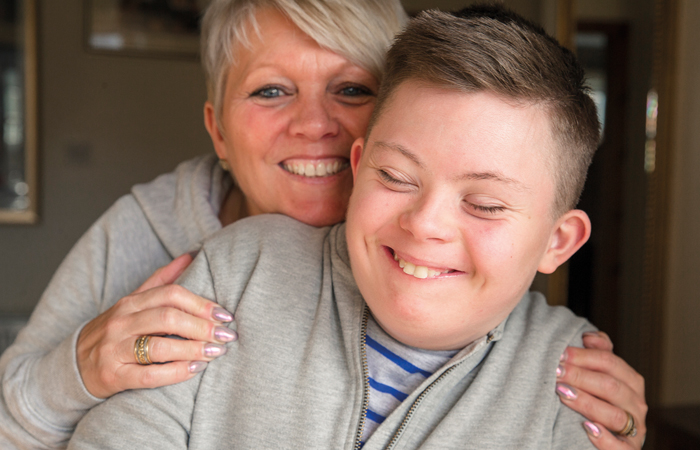Population Health

Understanding learning disabilities
In Population Health
Bookmark
Record learning outcomes
With 1.4 million people in the UK living with a learning disability, pharmacy staff need to understand the issues that affect this group, and some practical steps that can be taken to try and meet their specific needs
Learning disability is a broad term, but those who have one – over 1.1 million adults and nearly 350,000 children in the UK, according to the charity Mencap – are likely to experience difficulties with activities that others do without a second thought. This can include anything from household tasks, managing money and socialising. Individuals with learning disabilities take longer to learn, however, given the right support, most people with learning disabilities can lead independent lives, and pharmacy staff have a valuable role to play.

Learning disabilities explained
There are many ways in which learning disability is defined (see panel below), but broadly there are three core components: reduced intellectual ability, an impaired ability to manage everyday activities, and lasting the duration of the individual’s life.
It is important to note that a learning disability is different to specific learning difficulties such as dyslexia, as, in these, intellectual ability is not affected. It is also not the same as a mental health problem, because these can affect anyone at any time and are often manageable with treatment.
Sometimes there is no known cause for the development of a learning disability, however there are several risk factors:
- Chromosomal and genetic abnormalities
- Non-genetic congenital malformations such as spina bifida
- Birth complications that result in hypoxic (low oxygen) brain injury or cerebral palsy
- Extreme prematurity, usually regarded as being born earlier than 33 weeks into pregnancy
- Childhood illness such as meningitis, encephalitis and measles
- Childhood brain injury caused by an accident or physical abuse
- Childhood neglect
- Exposure in the womb to certain substances or pathogens, such as, alcohol, sodium valproate, rubella infection and the Zika virus.
Learning disabilities can be associated with physical health complications from epilepsy, weight problems and visual and hearing impairments to constipation, thyroid problems, swallowing difficulties, eczema and Parkinson’s disease. All of these can be compounded by difficulties communicating needs and accessing healthcare, as well as mental health problems including dementia, anxiety, depression, phobias, psychosis, bipolar disorder and schizophrenia.
The incidence of social inequalities is significant, with people with learning disabilities in the UK more likely to live in substandard housing, be exposed to tobacco smoke, be bullied or abused, and have insufficient social support. It can also be difficult for those around them, as many people with learning disabilities exhibit challenging behaviours such as aggression, withdrawal, destructiveness, disruptiveness, self-injury, compulsions, rituals and repetitiveness.
Varying definitions

Learning disability is a term that is defined in a number of ways:
The National Institute for Health and Care Excellence (NICE) defines a learning disability as meeting the three core criteria of lower intellectual ability (usually an IQ of less than 70), significant impairment of social or adaptive functioning, and originating in childhood
The Department of Health and Social Care works to the following definition: a significantly reduced ability to understand new or complex information and learn new skills, with a reduced ability to cope independently, which started before adulthood
The World Health Organization (WHO) used the term “intellectual disability” and defines it as a condition of arrested or incomplete development of the mind, characterised by impairment of skills which contribute to the overall level of intelligence in the form of cognitive, language, motor and social abilities. WHO also classifies severity:
- Mild – approximate IQ of 50-69 (in adults, this equates to a mental age of around nine to 12 years), which will mean some learning difficulties at school. However, many adults will be able to work, maintain social relationships and contribute to society
- Moderate – IQ in range of 35-49 (mental age of six to nine years in adults), resulting in marked developmental delays during childhood, but acquiring some degree of independence and adequate communication and academic skills so able to live and work as adults with some level of support
- Severe – IQ between 20-34 (in adults, mental age of three to six years) and likely to need continuous support
- Profound – IQ below 20 (mental age below three years in adults), with severely limited self care, communication, mobility and toileting.
Special support
Janet Beer, assistant headteacher and special educational needs coordinator (SENCo) at James Rennie School – an outstanding education provider for young people aged three to 19 years with severe or profound learning needs in Cumbria – has a wealth of experience in this area. She describes learning disabilities as “hidden disabilities”, meaning that it might not be obvious that someone has additional needs.
So how can someone with a learning disability be identified in pharmacy? “There are some indicators, for example, hesitancy, difficulty expressing why they have come to the pharmacy and articulating what they want, and a very deliberate way of speaking as they are thinking very hard about what they are saying,” Janet says. “Some people with learning disabilities will have learned strategies to cope with everyday situations such as going into a shop, but when a staff member engages them in conversation or questions them – as will often be the case in a pharmacy – it will usually become apparent that they don’t have the language to understand what they are being asked, or to respond.”
This leads to a clear first step when dealing with this customer group, continues Janet: “Understand that they can’t just think on their feet, so allow extra time for them to process what you are saying or asking, and to form their response. This might be up to 10 seconds, which can feel like a long time, so be patient.” Using short, simple sentences can help, she adds, which is contrary to the open questioning techniques pharmacy staff are usually encouraged to adopt, but inappropriate in these situations. However, leading questions should be avoided as these can cause confusion.
Given the right support, most people with learning disabilities can lead independent lives
Finding a path
Michelle Spires, inclusion leader at Mere Green Primary School in Sutton Coldfield, says: “Visuals can really help, particularly pairing pictures with words, but discretion is also important. For example, someone with a learning disability is likely to find something considered relatively straightforward, like signing the back of a prescription, quite difficult. Bear in mind that simply going into the pharmacy may have caused nervousness in the first place, so think about providing a way of indicating to pharmacy staff that they don’t want to do it in front of everyone – perhaps a card they can pass over the counter.”
More generally, building a rapport is a good way of breaking down barriers, states Michelle: “Think about giving opportunities for people with learning disabilities to come in when they don’t actually need anything, just to get to grips with the pharmacy and what you need to do when in there.”
Janet also picks up this theme. “It can be a busy and noisy environment which makes things more difficult, so use a quieter part of the pharmacy to minimise distractions, and make sure to talk quietly too,” she says, before sounding a note of caution about being overly familiar: “There is a fine line between maintaining professionalism and developing a personal relationship, and if the latter goes too far, there is a danger of breaching confidentiality.”
Parents and carers of children and adults with learning disabilities also require special attention, says Michelle: “There is a real fear of judgement because they know that the person they look after doesn’t behave in the way that the general public seems to expect. This is particularly true when it is a child, so having somewhere to go where the staff they talk to will know ‘It’s not me, it’s not my parenting, it’s just the way this child is in the world’ can be a real relief.”
Pharmacies can also implement strategies to make life a little bit easier. “Prescription collection and delivery services can ease a burden, but make sure to add a note to the bag to keep lines of communication open as parents and carers can become isolated,” Michelle says. “Aids such as dosing boxes can be good but they need to be clear, for example, by not just having the days of the week but having them in different colours so the person knows that red is Monday, blue is Tuesday and so on.”
Moving forward
There is a whole raft of support available for people with learning disabilities, from behaviour assessment and speech and language therapy to transition into adult care services and creative therapies. Every individual will have different needs so a one-size-fits-all approach simply doesn’t work and so pharmacy staff should ensure they highlight all services that may be appropriate. Flu jabs is a good example, as people with learning disabilities are one of the priority groups, but also provision such as cervical screening and even dentistry.
It’s important to remember that learning disabilities don’t define the person and Janet makes a crucial point: “These individuals – children or adults – are people first and foremost, so they deserve to be treated with respect and dignity.”
Find out more
- The Clinical Knowledge Summary on learning disabilities was recently updated and provides a useful overview
- The NHS website also provides some information on learning disabilities with links to care and support advice and services
- There is a wealth of information and resources on the website of the charity Mencap
- Another useful site in terms of links to resources is that of the British Institute of Learning Disabilities
- NICE has published several documents on learning disabilities, and has more in the pipeline.
